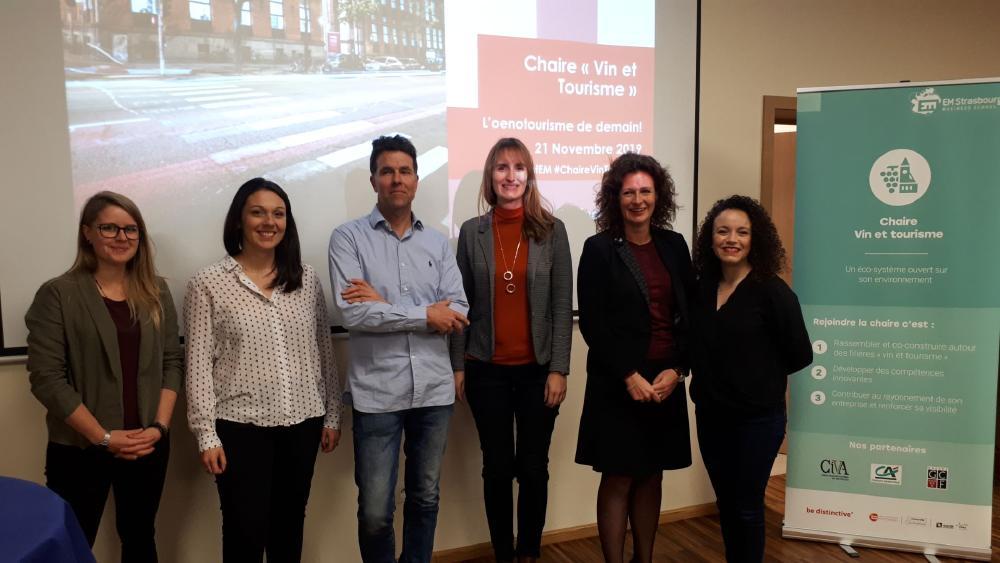
Traditional wine tourism is currently undergoing a revolution. The aim is to win over new, younger, more international, more connected audiences, likely to provide wine-producing regions with particularly valuable income supplements at a time when wine consumption is seeing a stagnation and competition is increasing. It's a global race for innovation!
Organized by the Wine and Tourism Chair at the end of June in Strasbourg, the first international scientific meetings on wine tourism highlighted the extent of the transformations taking place in this booming sector. In order to echo this scientific event, the Wine and Tourism Chair brought together more than 80 professionals from the wine and tourism sector on November 21 at the premises of the Cave du Roi Dagobert, on the initiative of the Mossig et Vignoble Local Tourist Office, to talk about the theme of the wine tourism of tomorrow!
Coralie Haller, Research Lecturer and Head of the Wine and Tourism Chair at EM Strasbourg started off the debate by recalling the aims of developing research projects and responding to concrete problems in the profession, notably by positioning it as a “think tank”, or a place for exchanging ideas. Several projects and initiatives were presented to illustrate the changes under way in the various facets of this activity, particularly around virtual reality, corporate wine tourism, cultural wine tourism, and the development of environmental wine tourism activities.
Virtual Reality: A Tool to Help the Wine Tourism Clientele
Virtual reality is in the midst of a growth phase, thanks to the appearance of ever more powerful tools. This NSPA (New Sales and Purchase Assistance) process helps the consumer to make decisions, while renewing their consumption experience and rehumanizing the link between the company and the customer. Charlotte Massa, Research Lecturer in Marketing at EM Strasbourg and a member of the Chair, recalled the three objectives of consumer immersion in virtual reality: transcending distance, time, and space. The La Bastide de Gaillac wine cellar has understood this and has been able to renew itself by creating a scripted virtual reality tour. An innovation that attracts consumers and builds up their loyalty by offering them an enhanced experience, and which allows the company to stand out from the competition.
The Need to Structure the Offer for the Corporate Wine Tourism Clientele
Based on the Master of Tourism Management thesis by Julien Baeumlin, a trainee at the CIVA [Conseil Interprofessionnel des vins d’Alsace], Yosr Ben Tahar, research lecturer at the Paris School of Business and a member of the Chair, spoke about corporate wine tourism as a real lever of attractiveness and competitive positioning in Alsace. “Alsace has a lot to offer in terms of wine tourism, there are many activities related to this theme”. The stakeholders concerned are divided into three categories: the offer (the companies which propose these activities), the intermediaries (travel agencies, tourist offices, etc.), and finally the demand, which emanates from companies or employee representative councils. In Alsace, France's third most visited wine region, corporate wine tourism represents a challenge that needs more development. The role of intermediaries is changing: they must implement collaborative strategies to ensure a successful experience and continue to develop this growing sector, effectively meeting the expectations of an ever-increasing and demanding clientele.
Cultural Tourism and Wine Tourism: A Win-Win Combination
Kerstin Bach, a tour guide and a member of the board of the Palatinate Culture and Wine Ambassadors, representing one of Germany's thirteen wine-growing regions, reflected on an interesting state initiative, beyond the tourism strategies already in place: the creation of “Culture and Wine Ambassadors”. The idea is to train guides to attract new customers in the wine sector. This is an innovative way to offer a new experience to potential customers, thanks to active cooperation with local tourist organization. These ambassadors of a new kind can propose a vast cultural offer around the theme of wine, aiming to revitalize wine tourism by highlighting its heritage.
Environmental Wine Tourism: Humanity and Nature at the Forefront!
For Giada Pasini, project manager in Ecotourism and Wine Tourism at the Mossig et Vignoble Local Tourist Office, the objective is to improve the tourist offer by “strengthening the links with tourism professionals”. Last season, the tourist office set up a program of nature and well-being activities: for 7 months, from May to November, 7 professionals led 7 workshops on these themes. This is a project that brings together people who share strong values around nature and the environment and which aims to create an open strategy by bringing them together around a project. After a test season, the tourist office is considering renewing this program, while strengthening the partnerships that have been set up.
Among these stakeholders are Georges Goudey and his company, Equisèm, which offers eco-tourism activities to discover fauna and flora during rides on a draft horse in the Marlenheim vineyard and its surroundings. While Georges Goudey has a very positive view of this experience, which allows visitors to discover the richness of this exceptional environment, he would like to extend this link through the development of environmentally friendly activities, so that visitors can make the most of this experience in their daily lives. This type of experience responds, among other things, to the expectations of authenticity, a relationship with the land, and contact with stakeholders in the landscape
To sum up, the wine tourism of tomorrow will depend on the ability of the profession to use information and communication technologies to improve customer relations, to develop and structure an offer to meet different types of customer (commercial wine tourists), to train and develop the talents of tomorrow, to promote a strong environmental approach, to rely on cultural and heritage assets, and to have a collective approach in terms of co-construction.
